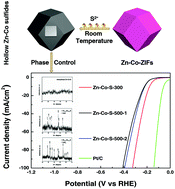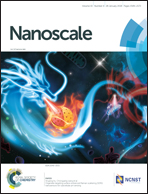Phase controllable fabrication of zinc cobalt sulfide hollow polyhedra as high-performance electrocatalysts for the hydrogen evolution reaction†
Abstract
Structure and phase modulations allow the development of highly active, cost-effective and stable electrocatalysts for the hydrogen evolution reaction (HER) but are rather challenging. In this paper, Zn–Co–S hollow/porous polyhedra with controllable phases were fabricated via solvent-based sulfidation at room temperature followed by thermal annealing. The obtained hollow structure Zn–Co–S-300 with an amorphous phase exhibits excellent electrocatalytic HER activity, which is higher than crystalline Zn–Co sulfides annealed at a higher temperature. Zn–Co–S-300 also shows a long-term working stability (91.7% current density retention over 10 hours) in alkaline media. This work provides a feasible approach for the fabrication of homogeneous ternary transition metal sulfide (TMS) electrocatalysts via the Kirkendall effect towards high-efficiency HER applications.



 Please wait while we load your content...
Please wait while we load your content...